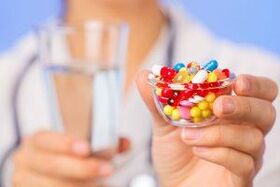
Prostatitis is a disease of the prostate gland, which can be very painful, but with the right comprehensive treatment, the disease will go into remission. Let us consider in more detail the most famous drug therapy -use antibiotics- What is the best type of antibiotic to treat prostatitis in men?
Antibiotics
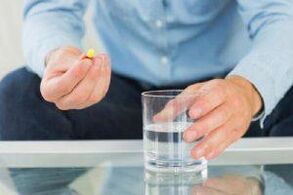
Drug treatment of prostatitis is usually limited to controlling its symptoms. Pain relievers can ease the pain. Antibiotics are used to treat prostatitis in menfor patients with acute or chronic infectionsProstate.
E. coli and other Gram-negative bacteria cause the most acute prostate infections.Symptoms includepain in the groin, difficulty urinating, pain during ejaculation, inability to urinate, as well as fever, general malaise.
The treatment of prostatitis in men is always antibiotics. Chronic infectious prostatitis may require long-term treatment with medication, and severe infections may require hospitalization, where the medication will be given by injection.
Next in the article, we will look at how to treat prostatitis in men with antibiotics.
Advantages and disadvantages
Antibiotics are always recommended if an infection is present or if it recurs within a year. They are indicated for the effective treatment of:
- Acute infectious prostatitis;
- Chronic infectious prostatitis.
The benefits of the drug include:
- Strongbactericidal properties;
- Bacteriostatic propertiesprevent the growth of bacteria;
- High efficiency- covers a wide range of infections;
- Easy to use. Most medications are taken by mouth or by injection;
- Few side effects;
- so economicThe drug is widely available and inexpensive.
The disadvantages includesystemic side effects, which varies depending on the antibiotic chosen, and typically includes:
- Diarrhea.Usually, during treatment, there is an increase in the amount of sugar in the intestine, causing a disturbance in intestinal bacteria;
- Fungal infectionsoral cavity, genital organs;
- The making progresskidney stones;
- Blood clotting disorderblood (when taking certain cephalosporins);
- Light sensitivity(when taking tetracyclines);
- Blood disorder(the "condensed" blood syndrome);
- Deaf(seldom).
Common side effects include:
- Abilityallergy;
- resistance of some bacteria. This occurs if the patient takes an inadequate dose.
Types of antibiotics
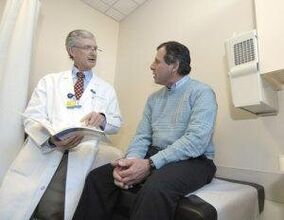
Usually, the patient is prescribed4 week course, but if the urologist suspects the presence of chronic prostatitis and the signs (as well as the pain) have not gone away after a four-week course, he may recommend taking longer. .
Sometimes courses of up to three months are used.
Antibiotics for prostatitis in menprescribed by the attending physiciandepending on:
- Pathogens that cause infection;
- The form of the disease (acute / chronic);
- Severity of symptoms;
- The patient's general health;
- age.
And based on the results ofanalysis, How:
- Blood test - extended profile;
- Total urinalysis;
- PCR (smear) of the urethra;
- Tank. urine culture;
- Analysis of prostate secretions.
Types of antibioticsused in prostate therapy:
- macrolite;
- Penicillin;
- Tetracyclines;
- Fluoroquinolones;
- Cephalosporins.
Which antibiotic is better and more effective?Prostatitis? Consider the names of antibiotics for prostatitis:
| Ingredient | Efficacy of the drug | Act | Recommended use (more details in the manual) |
|---|---|---|---|
| Macrolide drugs | Effective against urinary tract diseases (prostatitis, urethritis, cervicitis, epididymitis) | Slows down the active growth and reproduction of bacteria, has a disinfecting and antibacterial effect, has a bactericidal effect | 1-2 g 2-3 r/day Release form: tablets of 10 pcs. 500 mg |
| Semi-synthetic macrolide drug, erythromycin derivative | Effective for the treatment of chronic infectious prostatitis | Broad spectrum antibiotic. The drug has a broad antibacterial effect, many bacteria causing prostatitis are sensitive to the drug (streptococcal, Klebsiella, Escherichia coli, Staphylococcus aureus) | 0. 15 g 2 r/day before meals with plenty of liquid Available in capsules of 10 pcs. 0, 15, 0, 3, 0, 1 and 0. 05 g each |
| tetracycline derivatives | Effective for the treatment of infections such as acute/chronic prostatitis, chlamydia, gonorrhea, syphilis | Has bacteriostatic and anti-inflammatory effects | With a meal with plenty of liquid, 200 mg once, then 100 mg once a day Produced in the form of capsules of 10 pcs. 100mg |
| Semi-synthetic drug of the cephalosporin class | Antibiotics for the treatment of acute bacterial prostatitis in men. It is done against the background of serious bacterial infections | It has an antibacterial and bactericidal effect. Active against many prostatitis-causing microorganisms (streptococcal, staphylococcus aureus) | Intramuscular or intravenous, 1 g every 8-12 hours Release form: in syringes of 0, 5, 1 or 2 g |
| Cephalosporin preparations (in the form of sodium salts) | It is used for severe bacterial infections (prostatitis, epididymitis) | Has antibacterial and bactericidal effect | Intramuscular or intravenous injection, 1-2 g every 12 hours Available in bottles of 0, 5, 1 or 2 g |
| Broad-spectrum semisynthetic antibiotic of the penicillin group and clavulanic acid | Antibiotics are used for prostatitis, as well as in the treatment of gynecological infections, respiratory infections. | Has a bactericidal effect against gram-positive and gram-negative aerobic/anaerobic bacteria | 1 tablet of 250 mg (+125 mg) every 8 hours Produced in the form of tablets of 15 pcs 250 + 125 mg |
| Semi-synthetic drugs of the penicillin group | It is used to treat infections of the genitourinary system (urethritis, prostatitis, pyelonephritis) | Has antibacterial and bactericidal effect | Antibiotics for prostatitis, intramuscularly or intravenously, 500 mg 3 r/day or in tablet form 500 mg every 8 hours Produced in the form of ampoules for injection of 500 mg or in the form of tablets of 20 pcs. 500 mg |
| Lomefloxacin hydrochloride | It is used for prostatitis, chlamydia, pyelonephritis, urethritis | It has antibacterial, bactericidal, against gram-negative microorganisms that cause prostatitis | Tablets inside 400 mg 1 r / day Produced in the form of capsules of 10 pcs. 400 mg |
| Fluxyquinolone fluorine, a synthetic chemotherapeutic agent | Antibiotics are used to treat prostatitis | Active against bacteria such as streptococcus, staphylococcus, chlamydia | Take 250 mg tablets between meals or before meals with plenty of liquid Produced in the form of tablets of 5 pcs. 250 mg |
| fluoroquinolone antibiotics | Infections of the urinary tract, pelvic organs, genital organs | It has antibacterial, bactericidal effect, is active against bacteria such as streptococcus, staphylococcus, chlamydia, enterococcus, mycoplasma | 1 tablet before meals 200-800 mg/day Produced in the form of tablets of 10 pcs. 200 mg |
| A drug from the tetracycline group | It is used for respiratory infections, chlamydia, prostatitis, syphilis | Antibacterial, bacteriostatic action | 1 tablet 250-500 mg 4 r / day Produced in the form of tablets of 10 pcs. 250 mg |
Only your attending physician can decide which antibiotic is right for you.
If antibiotics don't help your prostatitis, you can switch tofolk remediesand try non-antibiotic treatments for prostatitis. Here are some of them: pumpkin seeds and honey, propolis, propolis candles, dead bees, soda and hydrogen peroxide, as well as monastery tea, Ivan tea and onions. You can also buy Chinese prostatitis patches.
Injections
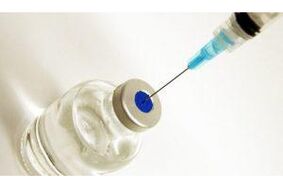
If the body does not respond to oral treatment, a specialist may prescribe an injection (intravenous / intramuscular injectionusually in the buttocks).
This method is also used to treat chronic/acute infectious prostatitis. It should only be considered after all other options have been tried, including oral antibiotic treatment for prostatitis, corticosteroid treatment, and traditional medicine.
Use the parenteral route if the patient has been on multiple courses of antibiotics for several months and all of them have been ineffective.
This reaction is due to the fact that infectious prostatitis is often caused by a local inflammatory process against the background of an autoimmune disease, and oral drugs do not bring the desired effect.
What drugs for prostatitis?
Antibiotics are usually given intravenously (and intramuscularly).3rd generation cephalosporins.Injections are strictly performed in the hospital. After 5 injections, remission usually occurs.
Contraindications
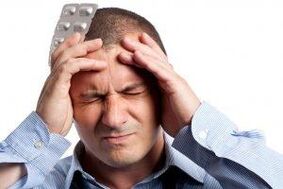
Contraindications often depend on the specific drug, but often include:
- Digestive disorders(especially when taking drugs of the macrolide group);
- allergic reaction (hive);
- Damage to the kidneys and liver(usually against the use of penicillins, cephalosporins, macrolides);
- Childhood(caution up to 18 years);
- Diabetes.
How to get
Tablets should be taken with 1, 5-2 glasses of water, taken with meals (unless otherwise indicated in the instructions) so as not to irritate the stomach. Drink after antibiotic treatmenta drug to restore intestinal flora.
Attention!Avoid alcohol completely during treatment.
Replacement
Infectious prostatitis is successfully treated with antibiotics, but if there are contraindications to hospitalization or if you have individual intolerance, hypersensitivity to some of its components, or when antibiotics do nothelp treat prostatitis, known as,natural antibioticprostatitis. They are often the least effective against the infectious form of the disease. So what drugs can replace antibiotics for prostatitis?
Most commonly usedechinacea, in its composition there is a special substance - echinacoside, whose properties are completely different from conventional antibiotics.
Infusions, herbal teas, decoctions prepared from plants, allow you to relieve prostatitis without antibiotics.
Has the same effectpoplar bark, known as "natural" antibiotics.
To treat a form of disease-causing bacteriaalso appointed:
- alpha blockers;
- non-steroidal anti-inflammatory drugs;
- corticosteroid drugs;
- 5-alpha inhibitors (slow prostate growth);
- Laxative.
With prompt medical care and comprehensive treatment, bacterial prostatitis can be completely cured with just one course of antibiotics.



























